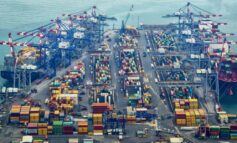 Edited by PortEconomics members Gordon Wilmsmeier and Jason Monios the new multidisciplinary book under the title “Geographies of maritime transport: transport, mobilities and spatial space”, delivers a unique collection of well-considered, empirically rich and critical contributions on maritime transport geographies. It covers a wide range of markets and territories as well as institutional, environmental and future issues.
Edited by PortEconomics members Gordon Wilmsmeier and Jason Monios the new multidisciplinary book under the title “Geographies of maritime transport: transport, mobilities and spatial space”, delivers a unique collection of well-considered, empirically rich and critical contributions on maritime transport geographies. It covers a wide range of markets and territories as well as institutional, environmental and future issues.
Maritime transport is a constantly evolving critical transport mode, thoroughly explored in this timely book from a geographical perspective. Chapters cover maritime shipping markets, territories of maritime shipping, institutional dimensions, and environmental and future challenges.
With contributions from researchers in a range of disciplines, including geography, economics, law, and spatial planning, as well as practitioners, the book emphasizes the wide-ranging interest in and impacts of maritime transport. Offering empirically rich studies of historical and contemporary geographies of maritime transport, this book also looks ahead to the importance of adaptation and of questioning the effects of the continued economization of maritime transport.
Geography, transport economics, logistics and management scholars will appreciate the thorough case studies and in-depth analyses of the topics offered in the book. It will also benefit industry and government representatives looking for a broader understanding of the recent evolution of maritime transport in a globalizing world.
PortEconomics members contributions in the volume:
PortEconomics members have been involved in the (co-)authorship of 11 port studies included in the volume:
- Geographies of maritime transport by Gordon Wilmsmeier and Jason Monios
- The geography of maritime trade: globalisation and beyond by Gordon Wilmsmeier and Jason Monios
- Geography versus topology in the evolution of the global container shipping network (1977–2016), by
César Ducruet, Justin Berli and Mattia Bunel - Commodity supply networks as complex adaptive systems: how commodity and freight markets respond to a supply shock, by Wouter Jacobs and Robert Horster
- The Panama and Suez Canals: re-engineered to be competitive, by Rodolfo Sabonge and Ricardo J. Sánchez
- The changing geography of cruise shipping, by Athanasios A. Pallis and George Vaggelas
- Container shipping: beyond the era of maturity?, by Gordon Wilmsmeier and Jason Monios
- Is there a case for state ownership in ports and shipping?, by Peter de Langen and Henrik Sornn-Friese
- Financial operators in port infrastructures: typologies, objectives and global strategies, Giovanni Satta, Francesco Parola, Enrico Musso and Francesco Vitellaro
- Assessing the strategic role of inland ports in urban freight policy: an application to the port of Brussels 292
Geoffrey Aerts, Michaël Dooms, Elvira Haezendonck and Mychal Langenus - Arctic sea routes: a new geography for shipping, Gordon Wilmsmeier
How to find more information about the book
Access Edward Elgar website to find more information and order your copy.
‘Wilmsmeier and Monios have assembled a comprehensive investigation by the world’s leading researchers into the many facets of maritime transport geographies. The 20 chapters provide excellent coverage of and insightful commentary on both traditional and emerging issues. This well-crafted book will be of interest to policy-makers, scholars and students.’ – Mary R. Brooks, Professor Emerita, Dalhousie University, Canada












